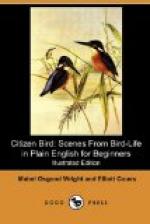“At first I didn’t know what they were, and then they seemed like some kind of Sparrows; so I went to the wonder room and looked at some of the books that you left out on the low shelf for us. I couldn’t find any picture that matched, but then I began to read about Sparrows, and when I came to Chippy Sparrow I was sure it matched; for the book said it was a clever little fellow with a jaunty red cap that came with his mate to the very door and that children make the Chippy’s acquaintance and hunt in the vines on the piazza or in a bush for its nest and that the nest is very neat and made of horsehair—” Here Dodo stopped to get her breath.
“Bravo! bravo!” called the Doctor. “I see that I shall soon have to resign my place as Bird Man if this young lady takes to bird hunting and reading also. Is there more to come, little one?”
“Yes, Uncle Roy, just a little bit more. Because the book said children looked for Chippies’ nests I went right away to see if I could find one. First I hunted in all the bushes, and the Catbirds scolded me and the Brown Thrasher in the barberry bush was very mad and a Robin in the low crotch of the bell-pear tree nearly tipped his nest over, he flew away in such a hurry. I thought I had better stop, but by this time I was way down in the garden and all at once I saw a Chippy fly straight into the big rose bush at the beginning of our arbor. I looked in and there about as high up as my chin was the loveliest little nest like a nice grass cup, with pretty rosebuds all around it for a trimming, and on it sat a Chippy—and do you know it never flew away when I stroked its back with my finger! It was so cute and friendly I thought I would give it a little mite of a kiss on top of its head. But I guess it misunderstood and thought I meant to bite, for it flew off a little way and I saw three speckled blue eggs and—then I thought I’d better come away.” “Did you hear it sing?” asked Nat.
“No—it only said ‘chip—chippy—chip.’”
“Chippies have two songs,” said the Doctor. “One is a kind of chirp or trill like an insect’s note—’trr-r-r-r-r.’ They give this usually when they first wake up in the morning. The other is a pretty little melody, but is less frequently heard.”
“If they eat seed, why don’t they stay here all winter?” asked Rap; “yet I’m sure they don’t.”
“They are not as hardy as some of their brothers, and do not like our winter weather; but even in autumn you may mistake them for some other Sparrow, for then Mr. Chippy takes off his brown velvet cap, and his dainty little head is stripped.”
The Chipping Sparrow
Length about five inches.
A dark chestnut cap, a light stripe over the eye, and a dark stripe behind the eye; forehead and bill black; back streaked with black, brown, and buff; rump slate-gray; wings and tail dusky.
Under parts plain light gray, almost white on throat and belly, darker on breast.




